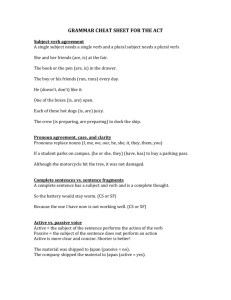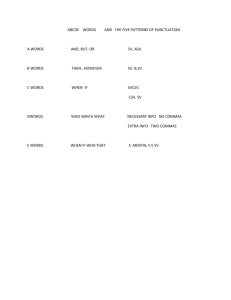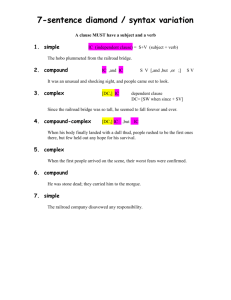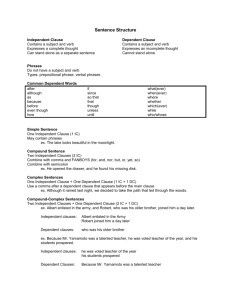COMMON LATIN CONSTRUCTIONS
advertisement
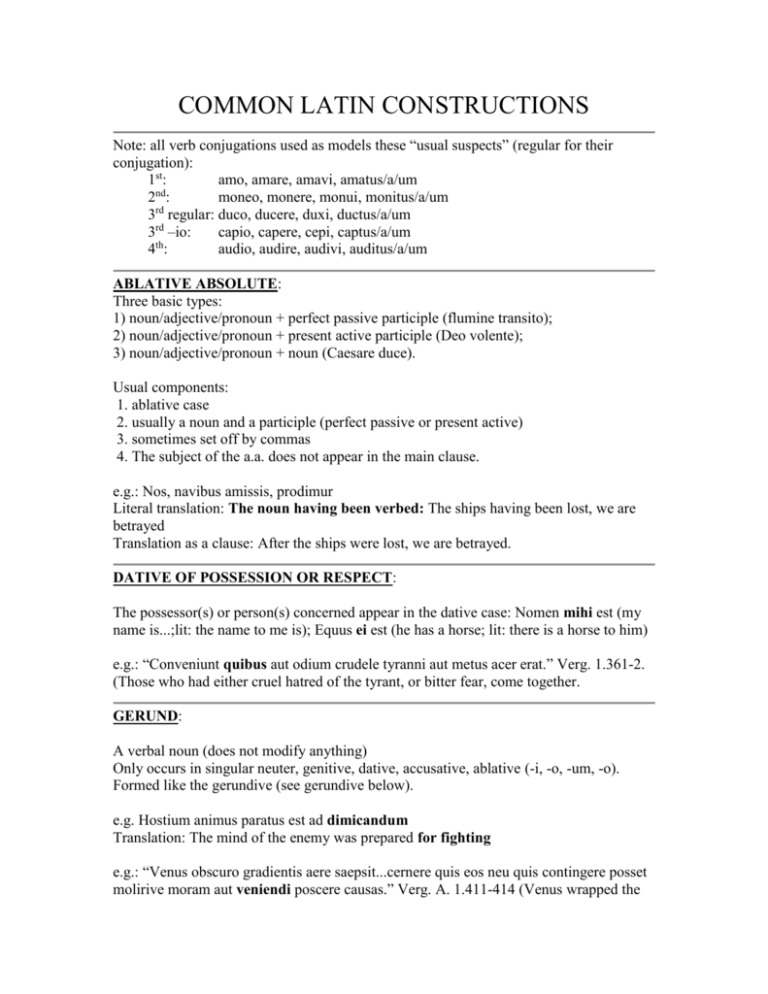
COMMON LATIN CONSTRUCTIONS Note: all verb conjugations used as models these “usual suspects” (regular for their conjugation): 1st: amo, amare, amavi, amatus/a/um nd 2 : moneo, monere, monui, monitus/a/um 3rd regular: duco, ducere, duxi, ductus/a/um 3rd –io: capio, capere, cepi, captus/a/um 4th: audio, audire, audivi, auditus/a/um ABLATIVE ABSOLUTE: Three basic types: 1) noun/adjective/pronoun + perfect passive participle (flumine transito); 2) noun/adjective/pronoun + present active participle (Deo volente); 3) noun/adjective/pronoun + noun (Caesare duce). Usual components: 1. ablative case 2. usually a noun and a participle (perfect passive or present active) 3. sometimes set off by commas 4. The subject of the a.a. does not appear in the main clause. e.g.: Nos, navibus amissis, prodimur Literal translation: The noun having been verbed: The ships having been lost, we are betrayed Translation as a clause: After the ships were lost, we are betrayed. DATIVE OF POSSESSION OR RESPECT: The possessor(s) or person(s) concerned appear in the dative case: Nomen mihi est (my name is...;lit: the name to me is); Equus ei est (he has a horse; lit: there is a horse to him) e.g.: “Conveniunt quibus aut odium crudele tyranni aut metus acer erat.” Verg. 1.361-2. (Those who had either cruel hatred of the tyrant, or bitter fear, come together. GERUND: A verbal noun (does not modify anything) Only occurs in singular neuter, genitive, dative, accusative, ablative (-i, -o, -um, -o). Formed like the gerundive (see gerundive below). e.g. Hostium animus paratus est ad dimicandum Translation: The mind of the enemy was prepared for fighting e.g.: “Venus obscuro gradientis aere saepsit...cernere quis eos neu quis contingere posset molirive moram aut veniendi poscere causas.” Verg. A. 1.411-414 (Venus wrapped the ones who were walking in a thick cloud so that no one could see them, or touch them, or contrive a delay, or demand the reasons for their coming) GERUNDIVE: (a.k.a. future passive participle) Verbal adjective (i.e., must modify a noun, existing or implied) Formed with the present stem of the verb: ama-, mone-, capi-, duc-, audi- +ndus/a/um e.g., amandus/a/um, monendus/a/um, capiendus/a/um, ducendus/a/um, audiendus/a/um Usually implies obligation or necessity Literal translation: must be verbed 1. Used with a preposition: e.g., Caesar venit ad haec facienda Literal translation: Caesar came to these things that must be done. Better translation: Caesar came to do these things (i.e., an easier way to do a purpose clause than using the subjunctive). e.g.: “Fingitis...Licinium autem, cum iam manum ad tradendam pyxidem porrexisset, retraxisse atque eo se in fugam coniecisse.” Cic. Pro Caelio 63 (You, however, pretend that Licinius, when he had already extended his hand to pass over the box, drew it back again and threw himself into flight) 2. Used in passive periphrastic construction (with optional dative of agent): Components: 1. Gerundive 2. A form of the verb to be (sum) 3. (Optional dative of agent) e.g., amandus est = he must be loved Dative of agent: amandus est nobis: he must be loved by us INDIRECT STATEMENT: Components: Verb of the head + accusative subject (optional) + infinitive + accusative object (optional; will not appear with an intransitive verb) e.g., Caesar scit Pompeium collocare milites. Translation: Caesar knows that Pompey is gathering an army. Sequence of tenses: Infinitives (see chart under infinitives): present: amare, amari (action happens at the same time as the main verb) perfect: amavisse (action happens before the main verb) future: amaturum/am/um esse (action happens after the main verb) e.g., 1. Present main verb, present infinitive: Dicitur Caesarem interficere Pompeium. It is said that Caesar is killing Pompey. 2. Present main verb, perfect infinitive: Dicitur Caesarem interfecisse Pompeium. It is said that Caesar killed Pompey. 3. Present main verb, future infinitive: Dicitur Caesarem interfecturum esse Pompeium. It is said that Caesar will kill Pompey. Subordinate clauses within the indirect statement have verbs in the subjunctive mood. INFINITIVES: Tense Present Future Perfect Active amare, monere, ducere, capere, audire (to verb) amaturus/a/um esse (to be about to verb) amavisse, monuisse, duxisse, cepisse, audivisse (to have verbed) PARTICIPLES: 1. Present active: Form: use the present stem + -ns, -ntis. 3rd declension: Passive amari, moneri, duci, capi, audiri (to be verbed) amandus/a/um esse (to be about to be verbed) amatus/a/um esse (to have been verbed) amans/amantis, monens/monentis, ducens/ducentis, capiens/capientis, audiens/audientis. Translated: “verbing” Examples: “apes...onera accipiunt venientum” (the bees receive the burdens of the ones coming). Vergil, A. 2.485 “armatosque vident stantis in limine primo” (They see the armed men standing on the first threshold) (Note the alternative –is for –es in the accusative f/m plural) 2. Future active: Trans: about to verb; will verb Formed using the fourth principal part + urus/a/um: amaturus/a/um, moniturus/a/um, ducturus/a/um, capturus/a/um, auditurus/a/um. 3. Future passive: see the gerundive. 4. Perfect passive = the fourth principal part of the verb Trans: verbed amatus/a/um, monitus/a/um, ductus/a/um, captus/a/um, auditus/a/um THE SUBJUNCTIVE MOOD TENSES OF THE SUBJUNCTIVE: 1. Present: Change the modal vowel: We beat a liar a. active: amem, moneam, ducam, capiam, audiam b. passive: amer, monear, ducar, capiar, audiar 2. Imperfect: present active infinitive + personal endings a. active: amarem, monerem, ducerem, caperem, audirem b. passive: amarer, monerer, ducerer, caperer, audirer 3. Perfect: a. active: third principal part + eri + personal endings amaverim, monuerim, duxerim, ceperim, audiverim (should look like the future perfect indicative) b. passive: fourth principal part + present subjunctive of sum amatus/a/um sim, monitus/a/um sim, etc. 4. Pluperfect: a. active: third principal part + isse + personal endings amavissem, monuissem, duxissem, cepissem, audivissem b. passive: fourth principal part + imperfect of sum amatus/a/um essem, etc. INDEPENDENT CLAUSES WITH SUBJUNCTIVE: 1. HORTATORY: First person only: Amem/Amemus Translation: Let me/us verb Example: Vivamus, mea Lesbia, atque amemus (let us live, my Lesbia, and let us love) _____________________ 2. JUSSIVE: Third person only: Amet/Ament Translation: Let him/her/it/them/nominative verb _____________________ 3. DELIBERATIVE: Always a question, can use any tense and any person: Quid faciam? Translation: What should I do? e.g.: “Heu quid agat? Quo nunc reginam ambire furentem audeat adfatu? Quae prima exordia sumat?” Verg. A. 4.284 (Alas, what should he do? By what address should he now dare to approach the raging queen? What first words should he assume?) _____________________ 4. OPTATIVE: Often (but not always) with utinam Utinam pater faciat hoc! Translation: If only father would do this! e.g.: “Utinam Cn. Pompeius cum C. Caesare societatem aut numquam coisses, aut numquam diremisses.” Cic. in Ant. 2.24 (If only Gnaeus Pompeius had never taken up association with Gaius Caesar, or had never abandoned it!). “At tibi pro scelus, ...pro talibus ausis, di...persolvant grates dignas et praemia reddant debita.” Verg. Aen. 2.535-538 (And may the gods give worthy pay and may they return due rewards to you for your evil, for such daring). ____________________ 5. POTENTIAL: Can be any person, any tense. Try this when none of the others work in context. Usually translated with “may/might verb” or “would verb” e.g. Hodie ad convivium veniam. I might come to the party today. e.g.: “Forsitan et Priami fuerint quae fata requiras.” Verg. A. 2.506 (Perhaps you might also ask what were the fates of Priam) DEPENDENT CLAUSES WITH THE SUBJUNCTIVE: __________________________ CONDITIONS: a.k.a. if, then statements Introduced by si (if) or nisi (if...not; unless) Indicative conditions: 1. Simple fact present: present indicative both clauses 2. Simple fact future/future more vivid: future indicative both clauses 3. Simple fact past: past indicative both clauses Subjunctive conditions: 1. Future less vivid (should-would): present subjunctive both clauses 2. Contrary to fact present: imperfect subjunctive both clauses 3. Contrary to fact past: pluperfect subjunctive both clauses e.g. SFPr: si hoc facit, errat. If he does this, he's wrong. SFF: si hoc faciet, errabit. If he will do this, he will be wrong. SFPast: si hoc fecit, erravit. If he did this, he was wrong. FLV: si hoc faciat, erret. If he should do this, he would be wrong. CTF Present: si hoc faceret, erraret. If he were doing this, he would be wrong. CTF Past: si hoc fecisset, erravisset. If he had done this, he would have been wrong. e.g.: “Quorum si utrumvis persuasissem, in has miserias numquam incidissemus.” Cic. In Ant. 2.24 (If I had persuaded either of them, we would never have fallen into this mess; CTF Past) e.g.: “Quae si valuissent, res publica staret, tu tuis flagitiis, egestate, infamia concidisses.” Ibid. (If they had been able to do these things, the Republic would stand, you would have fallen with your disgrace, poverty, infamy; CTF mixed) e.g.: “Huc est mens deducta tua mea, Lesbia, culpa/atque ita se officio perdidit ipsa suo/ut iam nec bene velle queat tibi, si optima fias/nec desistere amare, omnia si facias.” Cat. 75 (My mind has been brought to this point, Lesbia, by your fault, and it has so destroyed itself through its own sense of duty that it would not be able to esteem you now, if you should become the best, nor stop loving you, if you should do anything; FLV) e.g.: “Et si fata deum, si mens non laeva fuisset, impulerat [impulisset] ferro Argolicas foedare latebras, Troiaque nunc staret, Priamique arx alta maneres.” Verg. A. 2.54-56 (And if the gods’ fates, if their mind had not been opposed, if he had impelled us to befoul the Greek hiding places with a spear, Troy would now stand, and you, the high citadel of Priam, would remain; CTF mixed) __________________________ CUM CLAUSES: Dependent clause = cum + subjunctive cum = when (temporal), because (causal), although (concessive, with tamen) Cum Caesar veniat, edemus. When Caesar comes, we will eat. Cum Caesar non venisset, tamen edemus. Although Caesar has not come, nevertheless we will eat. NB: 1. Sometimes cum can appear as a preposition + ablative, in which case it means with 2. Sometimes cum is a conjunction, but does not take a subjunctive. This occurs when the meaning of cum is strictly temporal, and no causation is implied. In such cases, cum always should be translated “when” ________________________ INDIRECT QUESTION: Components: Verb of wondering + interrogative word + dependent clause with subjunctive verb Interrogatives: an, si, quid, cur, seu, sive, etc. e.g. Miratur an veniamus ad forum hodie. He wonders whether we are coming to the forum today. e.g. “Constituit quaerere quas vento accesserit oras, qui teneant loca (nam inculta videt), hominesne ferasne.” Verg. A. 1.307-308 (He decided to ask what shores he has approached, who holds the place --for he sees that they are uncultivated-- whether men or beasts) e.g.: “Forsitan et Priami fuerint quae fata requiras.” Verg. A. 2.506 (Perhaps you would also ask what were the fates of Priam) _______________________ PURPOSE CLAUSES: Independent clause + ut/ne + dependent clause with subjunctive Note: A relative pronoun can replace the ut/ne (Relative Clause of Purpose; see second and third examples) e.g.: Caesar fecit hoc ut urbem caperet. Caesar did this in order to capture the city. e.g.: “Aliquis mihi ab inferis excitandus est ex barbatis illis...qui obiurget mulierem et qui pro me loquatur ne mihi ista forte suscenseat.” Cic. Pro Caelio 33. (I must rustle up someone of those bearded men from the nether regions to castigate this woman and speak for me so that she is not perhaps angry at me) e.g.: “hoc, iucunde, tibi poema feci, ex quo perspiceres meum dolorem.” Cat. 50.16-17 (My pleasant friend, I have made this poem so that from it you would see my pain) _______________________ RESULT CLAUSES: Independent clause + ut/ut non + dependent clause with subjunctive (with adverbial or adjectival intensifier, such as tam, ita, sic, tantus/a/um, etc) Note: A relative pronoun can replace the ut/ut non (Relative Clause of Result) e.g.: Fuit tanta virtus in hac republica ut valeremus. There was such virtue in this republic that (as a result) we were strong. e.g.: Est innocentia adfectio talis animi quae noceat nemini. Innocence is of such a state of mind which (that it) harms no one. e.g.: Quis est tam invidus qui ab eo nos abducat? Who is so envious that he would withhold us from it? e.g.: Cur aut tam familiaris fuisti ut aurum commodares aut tam inimica ut venenum timeres? ______________________ RELATIVE CLAUSE OF CHARACTERISTIC: Describes a general characteristic that most people possess (for a characteristic particular to one person, the indicative mood is used) Independent clause + relative pronoun + dependent clause with subjunctive e.g. Caesar est qui numquam faciat hoc. Caesar is one who would never do this. e.g.: Odimus eos qui haec faciant. We hate people who would do these things.



